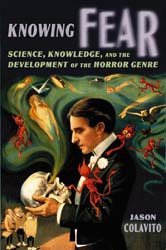|
Lost Civilizations Uncovered
|
|
About the Book: Knowing Fear
"This
is among the finest introductions to the horror genre I have read." -
D. Harlan Wilson, Journal of the Fantastic in the Arts vol. 20 (2009) "...an
accessible and thought-provoking book...usefully sets an agenda for debate in charting the changing societal and fictional
emphases in horror fiction through time and cultural change." -
Rebecca Janicker, Science Fiction Studies #107 (2009) Knowing Fear: Science,
Knowledge, and the Development of the Horror Genre is available now! Order your copy today from your favorite bookseller
or one of these online options: Overview of Knowing Fear The oldest and strongest emotion of mankind is fear, and the oldest and strongest kind of fear is fear of
the unknown. -- H. P. Lovecraft, Supernatural Horror in Literature (1927) The horror genre is nearly
two and half centuries old, but it unfairly lacks the critical respect granted to other genres. Scholars instead tend to reduce
horror to crude Freudian allegories about sex and miss the genre's intellectual undercurrents. This book tells horror's story
through the prism of the genre's overarching concern: the role of knowledge, in the form of "science," "technology," and "wisdom."
This book details the close relationship between developments in science and society and their parallels in horror literature
and the visual and performing arts. Horror deals with our ambiguous relationship with the defining institution of Western
civilization, science. Horror dares to take on the Western world's image of itself as a rational arbiter of nature's secrets,
and challenges us to explore and reconsider our relationship with science. Horror stories are a way of understanding and ultimately
transcending the limits of mind, knowledge, and science through fear. Horror Past and Present The horror story is a unique product of Western culture, one whose rise came in tandem with the development of the West's
major contribution to world culture: modern science. While every society has its tales of supernatural menace, it is only
in the West (and later Japan) that the horror story flourished as a unique metaphor for the displacement from the past, from
tradition, and from culture that modern science ushered in with its rapid development and promotion of change. Literature responded to
scientific progress in two ways: Science fiction represented our hopes and aspirations, the Golden Age that Progress was to
bring. But if science fiction represented our dreams, horror art in all its myriad forms crystallized our nightmares, the
dark fears that fester beneath the surface. Even science fiction concealed a quiet undercurrent of horror, often disguised
under the name "fantastic literature," or later, "the weird tale." It was the soot on the shining citadel of Progress. In this book I trace the
interrelationship of science (or more properly, knowledge) with horror art from the genre’s origins in the eighteenth
century to its florescence in the twentieth century to today. In doing so, I intend to examine well-known and obscure examples
of horror from multiple media, including literature, cinema, radio, television, video games, and internet manifestations.
Taken together, this revisionist history will demonstrate that contrary to most psycho-sexual interpretations of horror, knowledge--not sex--is the first and most awful source of horror, and horror stories reflect the same ambivalent attitude toward
the power of science that permeates modern thought. It seems that the core issue at stake in the horror story is the issue of science versus scientism. The former
is a way of learning through experimentation, theorization, and testing. The latter is a dogmatic acceptance that what is
known is all that can be known, and the accepted way of knowing is the only way to know. In a philosophical sense, horror
tales seem to face a very postmodern struggle: the battle between positivism (scientism) and pure science. The authorities
are powerless against the unseen forces because they cannot open their minds to investigate the possibility that the unseen
can be real. As a result, institutional authority makes impotent pronouncements of impossibility instead of attempting to
apply the methods of science to investigate. Like the heroes of Bram Stoker's Dracula, only those with open minds can
take in all the evidence to supersede the ignorance of institutional science and vanquish the supernatural foe. True science,
not scientism, wins the day but at the cost of admitting that there are other Things of which our philosophies cannot dream.
|
|
© 2007-2010 Jason Colavito. All rights reserved.
|

